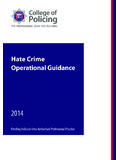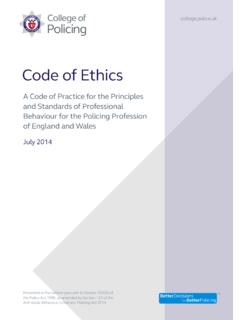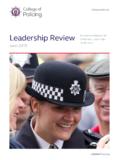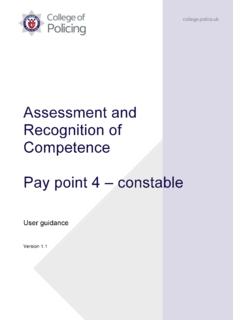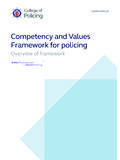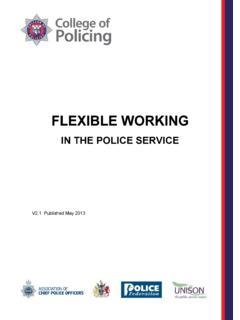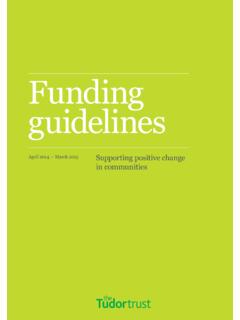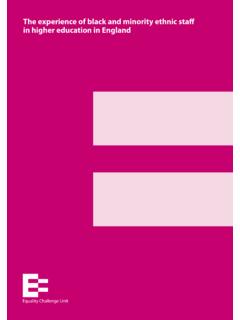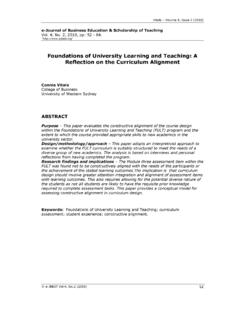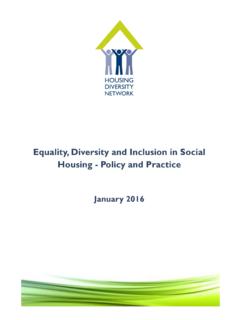Transcription of Frequently Asked Questions PEQF (October 2017)
1 1 Frequently Asked Questions peqf ( october 2017) Police Education Qualifications Framework 1. What is a qualifications framework? It is a system which credits equivalent levels of learning and expertise and enables employers and education providers to recognise and compare individuals achievements. The UK framework regulated by OfQual describes the entry level and 8 levels (see below). The most commonly recognised qualification tends to be used as a label. For example, level 3 is often described as being equivalent to A-levels and level 6 as equivalent to a degree. 2. What are the peqf s education principles? The sequence of progressive, national professional qualifications which, in its entirety, constitutes the peqf is being developed in accordance with the following professional education principles: meeting the professional requirements of 21st century policing ensuring national consistency of professional education championing a values-based, ethical approach to policing supporting equality of educational opportunity in the policing profession developing a high-quality, evidence-based education for the policing profession promoting a collaborative approach to education in the police service enabling continuing professional development in policing roles.
2 3. Does the peqf also apply to police staff? Yes, although there is no suggestion of a requirement for a degree for all roles. Some police staff will already have access to role-specific academic qualifications through professional bodies relevant to their role, for example, the Chartered Institute for Personnel and Development for HR and Chartered Institute of Public Finance and Accountancy for finance. There is, however, an intention to offer similar academic qualification opportunities to police staff in policing-specific roles such as intelligence, investigation and call handling. The ultimate aim is to establish an inclusive framework that integrates and aligns all police officer and staff roles.
3 Given the enormity of this task, the intention is to phase developments, with the initial priority being police officer qualifications 2 4. Why should policing have a formal qualifications framework? Professions support their members and help assure the public that discretion is exercised appropriately by setting clear conditions of membership. These commonly include using a published specialist knowledge base, commitment to an ethical code, keeping up to date with professional development and meeting an educational standard verified by nationally recognised qualifications. In policing, three of these elements of support for professional decision making have been introduced by the College of Policing.
4 Policing does not, however, currently set education levels for roles or ranks which reflect the skills and knowledge required to meet current and future challenges. Initial members of the College have stated that they want their professional body to develop national standards and ensure that their learning and expertise will receive external recognition. Introducing a qualifications framework would meet this demand and provide assurance that those working in policing are qualified to a consistent standard. 5. Aren t police officers already qualified? There are many highly trained and experienced people working in policing. The profession does not, however, currently set education levels for roles or ranks which reflect the skills and knowledge required to meet current and future challenges.
5 There is variable and inconsistent practice in terms of police education, with the result that some officers have no publicly recognised qualification. Such inconsistency risks undermining the professionalism of the police service. For most professions, a nationally recognised system of accreditation demonstrates that individuals have the required knowledge and skills for their role and thereby offers assurance to the public and to the members of the profession. The police service remains considerably out of kilter with other professions, particularly those which work to protect the public, with regard to its formal education standards. 6. What level of qualifications might people working in policing expect to reach?
6 Some categories of police staff role, such as human resources, have their own qualifications frameworks, while appropriate levels need to be proposed for police-specific roles such as call handling and investigators. One of the few national qualifications currently available to police constables, the largest group in the police service workforce, is set at level 3. The College has examined the qualification levels alongside its recent analysis and reviews and, together with stakeholders, has reached the view that level 6 is an appropriate reflection of demand on constables (see below). Those specialising and in senior managerial roles might expect to attain level 7 or 8 qualifications, the equivalent to a master s degree or PhD.
7 7. What is the evidence for qualifications at this level being useful? In addition to being transferable for individuals, there is evidence from US research that level 6 qualification might help meet future demand and have other potential benefits. US police forces which introduced a similar requirement found officers were better at dealing with complexity and used force more appropriately. 3 8. Aren t you downplaying the skills and competence of existing officers and staff? No, quite the opposite. The police service already benefits from a highly skilled workforce. The peqf will offer the opportunity to formally recognise that. 9. How are the changes going to be introduced?
8 Some police forces have already introduced a practical policing degree as part of recruitment. As a priority and to help with national consistency, the College has introduced three options nationally, either before entry or through a higher-level apprenticeship entry route, whereby people can reach a level 6 qualification while working in policing. Another of the priority areas has been to create a system to support existing officers and staff in the police service with obtaining a higher-level qualification if they chose to do so, known as the Recognition of Prior Experience and Learning. The Professional Development Platform has been created to support officers and staff. It contains information and guidance, a credit estimator to help individuals see how many credits they might be able to get for their learning and a directory of providers that have agreed to the process, including universities and other organisations offering professional qualifications.
9 It contains information about the courses available, how they are taught and assessed, the course cost and location and direct links to the course listed. 10. Is policing really a graduate-level job? Surely you don t need a degree-level qualification to break up a pub fight? If that was the only type of incident a police officer had to deal with, then a level 6 qualification would not be appropriate. Police officers, however, have to exercise personal judgement and responsibility and solve problems in complex, unpredictable contexts of all kinds, dealing with everything from child sexual exploitation to counterterrorism. 11. Isn t having common sense and a vocation more important than qualifications in policing?
10 People in policing need to demonstrate commitment and exercise good judgement, whether or not they have a qualification. Achieving a qualification does not prevent someone having common sense or a vocation for public service. A qualified person might feel able to challenge a majority view previously been accepted as common sense if it contradicted the best available evidence. The College s view is that people working in policing are best equipped with a combination of advanced knowledge, skills and decision-making frameworks to support them in their vocation and in exercising their personal judgement. 12. What value does being a graduate bring? Graduate-level skills and attributes (eg, critical thinking and analysis, communication skills, reflection, independent decision making, problem solving in complex and unpredictable contexts and research skills) are already demonstrated on a daily basis by current members of the service and will become increasingly important in policing.


